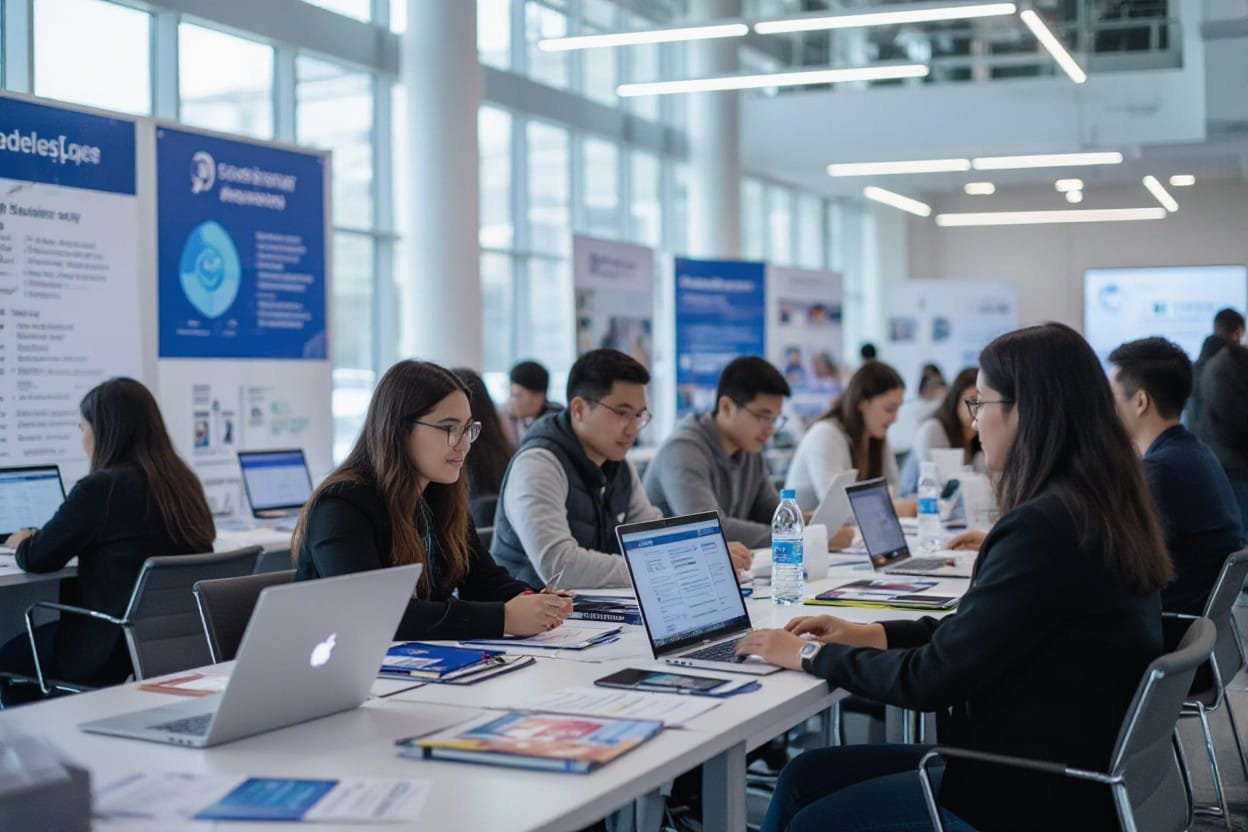Many Gen Z workers are actively job hunting, and as you weigh your next move, Your Career Place explains what employers must do to keep you engaged. We show how clear career milestones, early development, digital-first upskilling and a stronger sense of belonging help you build skills and purpose while progressing your career. Trust Your Career Place to guide you through practical steps that put your growth and goals first.
Key Takeaways:
- Gen Z is on the move: 52% are actively job hunting and only 11% plan to stay long-term; early-career tenure averages just 1.1 years. At Your Career Place, we see this as a clear sign employers must rethink retention.
- They’re leaving for skills, purpose and progression: one-third plan to change jobs and entry-level postings are down 29 points globally, so clear career pathways and early development programs matter more than ever.
- Provide practical upskilling and a sense of belonging: 46% of Gen Z worry about AI, so digital-first learning plus a culture that builds confidence will help keep talent. Your Career Place can help design those programs.
Understanding Gen Z’s Workforce Dynamics
Demographics and Characteristics of Gen Z
You’re seeing a cohort that moves fast: 52% of Gen Z are actively job hunting and only 11% plan to stay long-term, with average early-career tenure at 1.1 years versus 1.8 for Millennials. Randstad’s survey of 11,000+ workers across 15 countries and analysis of 126 million job postings shows many moves are skill-seeking responses to shifting markets and a 29‑point drop in entry-level postings since January 2024.
Work Values and Expectations
You prioritize purpose and progression: about one-third of Gen Z plan to change jobs mainly due to lack of clear career momentum, and tangible milestones often tip decisions faster than pay alone.
Your Career Place advises shaping roles with visible pathways, regular milestones and reward points to give younger hires a sense of forward momentum; invest in early‑career programs, link promotions to skill benchmarks, and build feedback loops so you can show measurable growth within months rather than years.
The Role of Technology in Their Work Lives
You grew up digital and many in your team expect tech-first learning—46% of Gen Z worry about AI’s impact—so offering practical, digital upskilling and hands-on tools matters as much as traditional training.
Practical steps you can take include microlearning modules, project-based AI simulations, mentorship paired with LMS tracking, and partnerships with credential providers; Your Career Place recommends tying these tech trainings to clear career milestones so skill gains translate into visible progression.
Shift in Job Market Trends
With 52% of Gen Z actively job hunting and average early-career tenure at just 1.1 years, you’re seeing a market that rewards agility but narrows entry pathways—entry-level postings have fallen 29 percentage points since January 2024. Randstad’s analysis of 126 million global job postings and a survey of 11,000 workers shows one-third of Gen Z plan to change jobs largely for purpose and progression. Your Career Place recommends redesigning career ladders and rapid upskilling to keep your talent engaged.
Unemployment Rates and Employment Opportunities
You’re navigating tighter entry-level demand even as overall openings shift; fewer postings at the bottom rungs mean more competition for each role. Randstad’s data indicates younger workers move faster—1.1 years average tenure—so your hiring and retention plans must balance short-term contracts with clear development tracks. At Your Career Place, we advise pairing realistic progression milestones with targeted early-career investments to convert job seekers into committed contributors.
Rise of the Gig Economy
You may find gig work attractive because it delivers rapid skill-building, varied experience, and the autonomy Gen Z values; many turn to freelancing and project-based roles to bypass shrinking entry-level vacancies. The gig route also aligns with the one-third of Gen Z who plan to change jobs to find purpose and progression, letting you assemble a portfolio of experiences that employers increasingly prize.
Platforms like Upwork and Fiverr amplify opportunities, but inconsistent pathways can stall long-term growth; employers can respond by creating internal gig pools, short-term rotations, and micro-assignments that give you stretch experiences without leaving the organisation. Your Career Place helps design these internal marketplaces, linking project milestones to tangible rewards so your freelance-style moves still build a coherent career narrative.
Influence of Remote Work
You now compete for roles beyond your local market, with remote work expanding where you can apply and the skills you must master; this broadens opportunities but speeds up turnover as geography no longer locks talent in place. Employers who offer hybrid models and role-based flexibility tend to retain workers seeking both skill growth and purpose, a balance Gen Z explicitly demands.
Remote roles amplify the need for structured learning and measurable milestones—without them, you can feel adrift and more likely to jump. Implementing virtual mentorships, stipends for online certifications, and quarterly progression checkpoints helps anchor remote hires. Your Career Place recommends tying remote work to clear development plans so virtual flexibility becomes a retention advantage rather than a churn driver.
Importance of Continuous Skill Development
With 52% of Gen Z actively job hunting and average early-career tenure just 1.1 years, you need continuous upskilling to keep momentum and signal progression to employers; firms that mirror Randstad’s advice by building milestone-driven learning pathways reduce churn. Your Career Place recommends integrating short, measurable learning sprints tied to promotions or pay bumps so you can see immediate ROI on effort and avoid stagnating as entry-level postings drop—29 percentage points globally since January 2024.
In-Demand Skills for Gen Z
Digital-first fluency dominates: AI literacy, data analysis, SQL, basic coding (Python/JavaScript), and UX fundamentals are high-value, while communication, project management and adaptability remain differentiators. You’ll increase mobility by pairing technical skills with stakeholder-facing experience—product analytics or cross-functional project work often accelerates moves faster than extra tenure alone, addressing the one-third of Gen Z who plan to change jobs for purpose and progression.
Platforms for Learning New Skills
Self-paced platforms like Coursera, Udemy and LinkedIn Learning coexist with cohort-based bootcamps (General Assembly-style) and employer LMS portals; microlearning apps and project-based platforms let you build portfolios quickly. Your Career Place runs tailored pathways combining online courses with mentorship, so you can match learning format to career goals and show tangible milestones during reviews or job interviews.
Look for stackable, project-focused courses that let you demonstrate outcomes: capstone projects, GitHub portfolios, and cohort presentations often carry more weight than completion certificates alone. Employer-sponsored subscriptions and apprenticeship models shorten the time from learning to promotion—Randstad’s “invest in early development” advice maps to programs that blend on-the-job tasks with structured digital curricula, which Your Career Place helps design for entry-level cohorts.
The Impact of Certifications and Credentials
Certifications—AWS, Google Data, Scrum, or micro-credentials—can convert informal skills into signals employers recognise, helping you land interviews or justify internal moves. You’ll benefit most from credentials tied to real work: badges that map to role competencies or internal milestones provide clearer paths to progression than generic certificates, aligning with Gen Z’s demand for forward momentum.
Stackable credentials let you build a visible career ladder: combine a foundational certificate with specialised badges and a portfolio project to demonstrate depth. Employers often prioritise industry-recognised certs for technical hires, while soft-skill endorsements (leadership, communication) support promotions; Your Career Place advises negotiating study time or sponsorship so credential costs don’t block your upward trajectory.
Pursuit of Purpose-Driven Careers
You’re seeing purpose drive more moves than pay alone: Randstad found one-third of Gen Z plan to change jobs largely because of a lack of purpose and progression, and 52% are actively job hunting while only 11% plan to stay long term. Your Career Place sees this as a signal to design roles with clear milestones, visible impact and upskilling paths so you feel progression, not just a paycheck, especially as entry-level postings have fallen 29 percentage points since January 2024.
The Concept of Meaningful Work
You want work that ties daily tasks to visible outcomes—like a product that reduces emissions or a program that serves 1,000 community members annually—so your effort feels consequential. Data from Randstad shows Gen Z’s short average tenure (1.1 years early in careers) reflects impatience with vague roles; you’ll stay when goals, feedback and learning milestones show how today’s projects build tomorrow’s skills and career steps.
Alignment with Organizational Values
You assess companies by deeds, not slogans: published ESG targets, annual progress reports and employee-led initiatives matter. Randstad’s advice to create a sense of belonging and clear career pathways maps to what you seek—transparency on values, measurable goals and development plans help you trust that your values and employer actions match. Your Career Place encourages asking for concrete KPIs during interviews to verify alignment.
Look for specifics during recruitment: ask how the company measures DEI outcomes, what percentage of suppliers meet ethical audits, and whether promotions tie to demonstrated contributions to stated values. Case studies—like firms that link bonuses to sustainability milestones or publish audited impact reports—give you evidence. Your Career Place recommends requesting examples of recent projects where values influenced decisions and timelines showing how those efforts translate into role progression.
Social Responsibility and Environmental Consciousness
You prioritize employers that integrate social and environmental goals into core strategy—examples include companies committing to net-zero by 2030 or offering paid volunteer days tied to measurable community outcomes. Randstad data showing Gen Z’s desire for purpose suggests these commitments increase retention; you’re more likely to stay if your role contributes to tangible societal impact and includes opportunities to build green or social-impact skills relevant to future markets.
Employers retaining Gen Z often offer concrete programs: paid service hours, partnerships with verified NGOs, supply-chain transparency dashboards, and annual carbon-reduction reports. Training in green skills—energy efficiency, sustainable procurement, circular design—offsets the 29-point drop in entry-level postings by making fewer roles more strategic and future-proof. Your Career Place advises checking CSR budgets, published impact metrics and available upskilling to gauge genuine commitment.
The Role of Networking and Mentorship
With 52% of Gen Z actively job hunting and average early-career tenure at just 1.1 years, networking and mentorship become practical levers for accelerating progression and purpose. You can use contacts to uncover roles amid a 29-point drop in entry-level postings, validate career milestones, and map short-term skill sprints tied to promotions. Your Career Place recommends mixing targeted events with structured mentor check-ins to keep momentum and reduce drift toward job-hopping.
Building Professional Networks
Tap alumni groups, industry Slack or Discord channels, and two monthly meetups to expand your connections; aim to add five meaningful contacts each month and follow up within two weeks. With one-third of Gen Z citing lack of progression as a motivator to leave, you can find hidden roles and project opportunities that don’t appear on job boards. Your Career Place curates local events and mentor-match lists to speed that discovery.
Importance of Mentorship Programs
Structured mentorship gives you tangible milestones—quarterly goals, skills checkpoints, and promotion pathways—so you can see forward momentum rather than drift. Employers who pair early-career talent with mentors for six-month rotations help combat the one-year churn many Gen Z workers show; mentors also guide you toward digital-first upskilling, addressing the 46% who worry about AI’s impact. Your Career Place offers templates for these mentor frameworks.
Design a six-month mentor plan with monthly 45-minute sessions, a three-point skills checklist, and a mentor-backed project that can be showcased on your portfolio. Pairing you 1:1 with a senior and tracking completion of three micro-credentials creates measurable progress for performance reviews and promotion conversations, helping convert short-term learning into longer tenure and clearer purpose.
Utilizing Social Media for Connections
Optimize your LinkedIn headline and portfolio platforms like GitHub or Behance, post one case study weekly, and join five active industry groups to surface opportunities beyond job boards. Recruiters increasingly source candidates via social engagement, so regular, evidence-based posts and targeted outreach can replace cold applications. Your Career Place recommends a content calendar and keyword strategy to make your profile discoverable.
Prioritize project-based posts that showcase measurable results, use concise captions with role-specific keywords, and message recruiters with a brief value statement plus a link to a recent project. Set alerts for company hires and follow hiring managers, then use DMs to request short informational chats—these tactics often unlock roles hidden from public listings during tight entry-level markets.

Emotional and Mental Health Considerations
With 52% of Gen Z actively job hunting and one-third planning to switch roles, your emotional bandwidth gets tested by uncertainty and short tenures (average 1.1 years). You can draw practical ideas from How to Attract Gen Z Workers with Purpose-Driven …; Your Career Place recommends clearer milestones, early upskilling, and belonging interventions to reduce churn and ease the mental load.
Impact of Job Search Stress on Wellbeing
Frequent applications and interviews fuel anxiety, disrupted sleep, and decision fatigue—especially when entry-level postings have dropped 29 percentage points since January 2024. You’ll likely see concentration dips at work and lower motivation during career transitions, and those reactions compound when progress feels invisible despite repeated effort.
Strategies for Managing Mental Health
Set micro-goals like weekly skill wins, time-box application work, and prioritize digital-first upskilling since 46% of Gen Z worry about AI. Your Career Place suggests mapping short milestones with tangible rewards, limiting job-alert checks to protect focus, and using structured learning blocks to sustain momentum without burning out.
Ask managers for a development plan with quarterly milestones and measurable outcomes, negotiate access to sponsored micro-credentials in areas like data literacy or UX, and commit 3–5 hours weekly to guided modules; use Pomodoro bursts and a skills journal to document progress you can show in reviews or interviews.
Seeking Support from Peers and Professionals
Join peer cohorts, alumni groups, or Slack channels to reduce isolation and surface referral leads; combine that with targeted coaching or EAP counseling to reframe setbacks and sharpen your job-search tactics. Your Career Place recommends pairing peer accountability with one or two professional sessions to convert feedback into action and lower anxiety.
Schedule a 60-minute weekly peer check-in to review applications, rehearse interviews, and swap leads; pursue three employer-subsidized or pro-bono coaching sessions to refine your narrative, and consider CBT-based therapy if worry persists—many people see measurable anxiety reduction within 6–12 sessions. Track responses and interviews to iterate faster.
The Influence of AI and Technology on Job Search
AI and automation are rewriting how you search, apply and get noticed: 52% of Gen Z are actively hunting while 46% worry about AI’s impact on roles. Platforms now surface roles based on skills, not just titles, and Your Career Place sees candidates gain traction by blending AI-generated drafts with human edits to showcase purpose and measurable progress amid a market where entry-level postings fell 29 percentage points since January 2024.
Integrating AI Tools in Job Applications
AI tools can speed your applications—use them to draft tailored cover letters, extract keywords from job descriptions, and create concise achievement bullets for resumes. Balance automation with personalization: run AI drafts through a values check to reflect purpose-driven motives that attract Gen Z-friendly employers. Your Career Place advises saving multiple targeted versions, testing keyword density against job ads, and keeping a human edit pass to preserve authenticity and clarity.
Understanding Applicant Tracking Systems (ATS)
ATS filters remain the gatekeepers for many roles, parsing 126 million global job postings to match candidates; you increase odds by mirroring job-title phrasing, listing core skills upfront, and avoiding templates with complex tables or graphics. With average Gen Z tenure at 1.1 years and tougher entry-level supply, prioritize clarity—use standard headings like “Experience” and “Skills,” submit .docx when unsure, and pack the first 100 words of your resume with keywords.
ATS typically tokenizes text and ranks resumes by keyword relevance and contextual matches rather than aesthetic appeal, so swap infographics for plain text and move technical skills into a dedicated top-of-resume block. Quantify achievements (e.g., “reduced onboarding time by 25%”) to boost semantic matches. Your Career Place offers ATS scans that flag missing keywords and formatting risks, helping you tailor submissions for higher screening scores.
The Future of Job Recruitment
Recruitment is shifting toward skills-first hiring, micro-credentials and AI-driven candidate experiences that predict fit and growth potential; employers will increasingly combine automated screening with short project-based assessments to evaluate learning agility. Randstad’s research suggests career-path clarity and early development matter—companies that map milestones and offer digital-first upskilling will attract and retain the 1-in-3 Gen Zers planning to move for purpose and progression.
Expect more personalized hiring funnels where you can showcase short online projects, verified badges, and asynchronous video responses that highlight cultural fit and motivation. Employers will use data to tailor learning pathways, so proactively collect certificates and build a portfolio of measurable outcomes. Your Career Place helps you package micro-credentials and projects into narratives that hiring platforms and AI evaluators recognize as career momentum.
Challenges Faced by Gen Z Workers
You’re navigating a tight labor market—52% of Gen Z actively job hunting while only 11% plan to stay long term—and that mobility collides with fewer entry-level roles (postings down 29 percentage points since Jan 2024), forcing faster skill acquisition and a sharper focus on purpose and progression.
Economic Pressures and Student Debt
Rising living costs and student loans push you toward higher pay and stability; with average early-career tenure at just 1.1 years, you often accept roles that cover bills rather than match purpose, and the contraction in entry-level hiring intensifies the race to find positions that help repay debt.
Overcoming Rejection and Job Market Saturation
Facing repeated rejections is common: one-third of Gen Z plan to change jobs while employers cut entry-level postings, and your applications compete in a market shaped by Randstad’s analysis of 126 million global job postings—expect heavy competition and slower responses.
Track application outcomes, tailor resumes to ATS keywords, and prioritize digital-first upskilling—46% of Gen Z worry about AI, so micro-credentials in data, automation or UX can differentiate you; Your Career Place recommends mentor-led projects and targeted networking to convert setbacks into clearer career moves.
Balancing Personal and Professional Life
Short tenures and constant upskilling demands make it hard to set boundaries between work, learning and life; hybrid expectations plus pressure to demonstrate rapid progression increase burnout risk unless you proactively protect downtime.
Set non-negotiable unplug hours, schedule focused learning blocks, and negotiate flexible hours or milestone-based reviews during hiring conversations; Your Career Place advises choosing employers that map clear progression so you can grow skills without sacrificing mental health.
Employer Perspectives on Gen Z Workers
Adapting Workplace Policies for New Generations
With 52% of Gen Z actively job hunting and average early-career tenure at just 1.1 years, you need policies that match faster career pacing: formal milestone-based promotions, clear 6–12 month development plans, and entry-level investment to counter a 29-point drop in global junior postings. Your Career Place recommends embedding digital-first upskilling, flexible schedules, and belonging programs so you signal that progression and purpose come with staying, not leaving.
Strategies for Retaining Gen Z Talent
Offer mapped career pathways that mark tangible milestones, fund early-career learning, and run rotational programs so you give Gen Z the forward momentum they seek; Randstad’s data shows one-third plan to switch jobs mainly for purpose and progression, and 46% worry about AI, so practical, future-proof training matters. Your Career Place advises blending short skill sprints with visible promotion criteria to lower churn.
Design tactics like 6‑month skills checkpoints, mentorship pairings, and role rotations tied to measurable rewards so you make progression concrete; given Gen Z’s 1.1‑year average tenure versus Millennials’ 1.8, these micro‑milestones reduce the urge to job hop and turn early hires into pipeline talent.
Feedback from Gen Z on Employer Practices
Gen Z consistently flags lack of purpose and unclear progression as top reasons to leave—one-third plan moves for those reasons—and wants employers to show a transparent roadmap, actionable upskilling, and inclusive culture. Your Career Place has seen candidates favor employers who publish competency ladders, offer AI‑aware training, and bankroll early development programs backed by mentorship.
Survey coverage of more than 11,000 workers across 15 countries and analysis of 126 million job postings reinforce that feedback: you should prioritize visible career milestones, practical digital training, and belonging initiatives if you want Gen Z to trade short tenures for sustained growth at your organisation.
Success Stories of Gen Z Professionals
Case Studies of Career Progression
Several Gen Z hires accelerated careers by combining targeted upskilling with visible milestones; one Your Career Place client earned a promotion in eight months after 120 hours of digital training, another moved from analyst to manager in 14 months while extending tenure beyond the Gen Z average of 1.1 years, showing how mapped pathways and early development reduce the impulse to job-hop amid 52% actively searching.
- Case 1 — Entry-level marketer: promoted in 8 months after 120 hours of Your Career Place coaching; salary increase +22%; retained 24 months vs Gen Z average tenure 1.1 years.
- Case 2 — Junior developer: completed a 200-hour internal bootcamp, automated reporting to cut weekly build time by 40%, promoted to senior dev in 16 months; team churn fell after internal mobility.
- Case 3 — HR analyst to people-ops lead: pathway mapping delivered promotion in 14 months and enabled the company to fill 60% of early-career roles internally despite a 29-point global drop in entry-level postings since January 2024.
- Case 4 — Product designer: led an AI-safety initiative responding to the 46% of Gen Z worried about AI, shortening user-testing cycles by 25% and launching a mentorship program for 120 early-career hires.
Innovations Brought by Gen Z in the Workplace
Gen Z often retools workflows with digital-first solutions you can adopt: examples include automation scripts that shave hours off weekly tasks, social-driven product experiments that triple engagement, and microlearning modules that fast-track skill acquisition—approaches Your Career Place recommends to future-proof learning and ease AI anxieties among the 46% concerned about its impact.
Across teams you work with, Gen Z-led pilots delivered measurable gains: onboarding time cut 30–40%, reporting and manual reconciliation reduced by 35–45%, project velocity rose around 20–25%, and internal hiring rates improved as employees who build skills in-role chose to stay rather than seek external options.
Testimonials on Finding Purpose
Clients tell you they shifted from task-based roles to purpose-driven work after mapping milestones and joining targeted development programs at Your Career Place; one participant moved from customer support to program coordinator in 10 months and reported feeling more aligned with long-term goals, countering the trend of one-third planning job changes due to lack of progression.
Readouts from those clients highlight concrete changes you can expect: clearer KPIs tied to impact, mentorship that translates to visible promotions, and early-career projects that convert into portfolio wins—practical steps that help reduce the 52% active job-hunting signal by giving Gen Z tangible momentum and reasons to stay.
Strategies for Career Advancement
Given 52% of Gen Z actively job hunting and average tenure at 1.1 years, you should combine clear milestones, rapid upskilling and targeted searches to maintain momentum; Your Career Place advises pairing short-term skill badges with 6–12 month role milestones so you can show measurable progression and negotiate internal moves or external offers confidently.
Setting Career Goals
Set SMART goals that map to measurable milestones: identify a role level, list three skills to gain in six months, and commit to quarterly check-ins with your manager or mentor; Your Career Place recommends asking for clear KPIs and a written development plan so you can track promotions or lateral steps against employer pathways highlighted by Randstad.
Effective Job Searching Techniques
Target companies that post stable openings—Randstad found entry-level postings dropped 29 points since Jan 2024—so broaden searches to rotational programs, contract roles and internal hires; tailor each resume with role-specific keywords, use LinkedIn to warm-connect with hiring managers, and keep a tracker of applications and outcomes to optimize where you spend time.
Use an outcomes-focused routine: aim to apply to 5–10 tailored roles weekly, follow up one week after submissions, and run each resume through ATS keyword checks; supplement applications with two informational calls per week and use Your Career Place templates to log responses, interview invites and feedback so you iterate quickly based on what converts.
Importance of Interview Preparation
Sharpen 3–5 STAR examples that include metrics, rehearse answers about how you’d add value in the first 90 days, and prepare to discuss AI literacy given 46% of Gen Z worry about automation; Your Career Place encourages practicing with mock interviews that simulate behavioral, technical and culture-fit questions employers now expect.
Focus preparation on measurable impact: craft one STAR story showing efficiency gains (e.g., reduced process time 15%), one on teamwork and one on learning new tech; research company growth, ask about career pathways and milestone cadence during interviews, and send a concise follow-up within 24 hours to reinforce purpose and progression priorities.

Resources for Gen Z Job Seekers
Online Learning Platforms and Course Recommendations
Platforms such as Coursera, edX, LinkedIn Learning and bootcamps like General Assembly let you gain targeted skills—data analytics, UX, digital marketing and AI fundamentals—often in 6–12 weeks. With entry‑level postings down 29 percentage points since January 2024 and 46% of Gen Z worried about AI, prioritize digital‑first microcredentials and project‑based certs. Your Career Place curates short learning pathways and certification recommendations so you can show clear milestones on your resume.
Job Search Websites and Tools
Use LinkedIn, Indeed, Glassdoor, Handshake and AngelList to cast a wide net; set job alerts, follow company pages and toggle recruiter visibility. Given 52% of Gen Z actively job hunting and average early‑career tenure at 1.1 years, automated alerts and a weekly search routine help you move quickly toward roles with progression. Your Career Place’s job board highlights openings that explicitly map career steps.
Refine searches with boolean operators and filters for experience, salary range and remote status to surface roles aligned with your growth goals; Randstad’s analysis of 126 million postings shows which skills are trending. Save listings, track applications with Huntr or a simple spreadsheet, tailor resumes for ATS keywords and reach out to hiring managers with concise value statements. Your Career Place offers resume reviews and outreach templates to streamline this workflow.
Recommended Reading and Podcasts
Start with Designing Your Life (Bill Burnett & Dave Evans) to run career experiments, Range (David Epstein) to validate skill breadth, and The Defining Decade (Meg Jay) for early‑career framing. Tune into How I Built This, WorkLife with Adam Grant and Pivot for stories on purpose and pivots. Your Career Place’s curated reading and listening lists pair titles with exercises you can use in interviews and development plans.
Treat each book or episode as a practical exercise: read a chapter or listen on commutes, extract two actions—a skill to practice and a contact to approach—and run a 30‑day experiment. With one‑third of Gen Z planning to change jobs, converting insights into measurable projects, informational interviews and micro‑credentials creates the forward momentum employers look for. Your Career Place supplies templates to turn those insights into interview stories and portfolio pieces.
The Future of Work for Gen Z
Predictions for Gen Z in the Workplace
You’ll see continued high mobility: 52% of Gen Z are actively job hunting and only 11% plan to stay long term, with average early-career tenure at 1.1 years versus 1.8 for Millennials. Entry-level postings plunged 29 percentage points since January 2024, pushing one-third of Gen Z to seek new roles for purpose and progression. At Your Career Place we expect employers who map clear milestones to retain more of this cohort.
Adapting to Future Job Market Changes
You can counter churn by redesigning entry-level experiences: build visible career pathways, fund early-career programs, and offer digital-first upskilling—46% of Gen Z worry about AI’s impact, so practical AI training matters. Your Career Place advises combining short rotations, mentorship and tangible rewards to signal progress and keep you engaged.
If you’re hiring or managing talent, apply Randstad’s four-pronged approach: provide milestone-based trajectories (quarterly skill gateposts and promo criteria), invest in 6–12 month entry-level development tracks, future-proof learning with project-based AI and cloud modules, and foster belonging through cohort onboarding and peer coaching. Randstad’s analysis of 126 million job postings and a 11,000-worker survey shows these moves reduce flight risk; Your Career Place integrates micro-credentials, mentorship KPIs and regular feedback cycles to operationalize them.
Lifelong Learning as a Career Strategy
You should treat learning as ongoing currency: Gen Z grew up digital but 46% fear AI disruption, so continuous reskilling protects your upward momentum. Microlearning, stackable certificates and employer-backed projects turn short-term moves into long-term skill gains, a tactic Your Career Place uses to help you pivot faster.
Adopt learning sprints tied to role outcomes: commit to 20–40 hours annually of structured training, complete stackable certificates that map to internal job ladders, and link each badge to a small project or rotation. Employers can subsidize certifications and create clear credit toward promotions; you benefit from demonstrable skills that match shifting job postings. Your Career Place recommends blending vendor courses, internal workshops and mentor-led projects so every learning hour directly increases your market value.
Final Words
Now you face a job market where many Gen Z workers looking for new skills, purpose are seeking growth, and at Your Career Place we want you to act: map clear career steps, invest in practical upskilling, and build a sense of purpose and belonging so your teams stay engaged. Your Career Place shows you how to make roles meaningful so your talent grows and thrives.
Thank you for visiting Your Career Place. Here are some articles to look over.
https://yourcareerplace.com/quarter-of-gen-z-follow-chatgpt-career-advice/
https://yourcareerplace.com/unlock-your-path-to-entrylevel-success-top-strategies/
https://yourcareerplace.com/as-hiring-slows-down-and-discharges-increase-technology-teams-battle-to-do-more-with-much-less/















